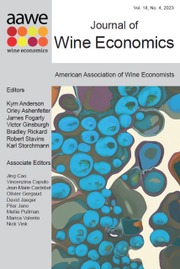
The American Association of Wine Economists (AAWE) and the wine economics community were saddened to learn of the passing of Dr. Roman Weil on February 1, 2023, after a yearlong battle with cancer. He was 82 years old.
Roman Weil was born on May 22, 1940, in Montgomery, Alabama. He received his BA in mathematics and economics from Yale University in 1962 and his PhD in economics from Carnegie Mellon in 1966.
Roman Weil was the V. Duane Rath Professor Emeritus of Accounting at the University of Chicago Booth School of Business. His Chicago Booth career started in 1965 and lasted until his retirement in 2008. He co-authored more than 12 textbooks, including the popular Accounting: The Language of Business. Outside of academia, he served as a consultant to the U.S. Securities and Exchange Commission, the U.S. Treasury, and the Financial Accounting Standards Board.
Roman Weil was an AAWE member from its inception in 2006. AAWE members will remember the blind triangle tests he conducted at our wine economics meetings as they reflect his inquisitive mind. Two different wines were served in three different glasses; that is, two glasses contained identical wine, and one was different—can one detect the singleton? To our surprise, even wine economists did not do better than random.
For the Journal of Wine Economics, Roman authored one research article and three book reviews. His wine economics work has been experimental, often using wines from his own cellar, which he generously provided. In his highly cited article “Debunking Critics’ Wine Words: Can Amateurs Distinguish the Smell of Asphalt from the Taste of Cherries?” (Weil, Reference Weil2007) presents support for his hypothesis that wine consumers cannot match critics’ descriptions of wines with the wines themselves. In another, much earlier paper, he analyzes the returns to cellaring wine by referring to his own wine collection (Weil, Reference Weil1993). The title already reveals his results: “Do not invest in wine, at least in the U.S., unless you plan to drink it, and maybe not even then. Or: As an investment wine is a no corker.”
AAWE and its members will greatly miss Roman. He was a dear friend to many of us and will not be forgotten.




